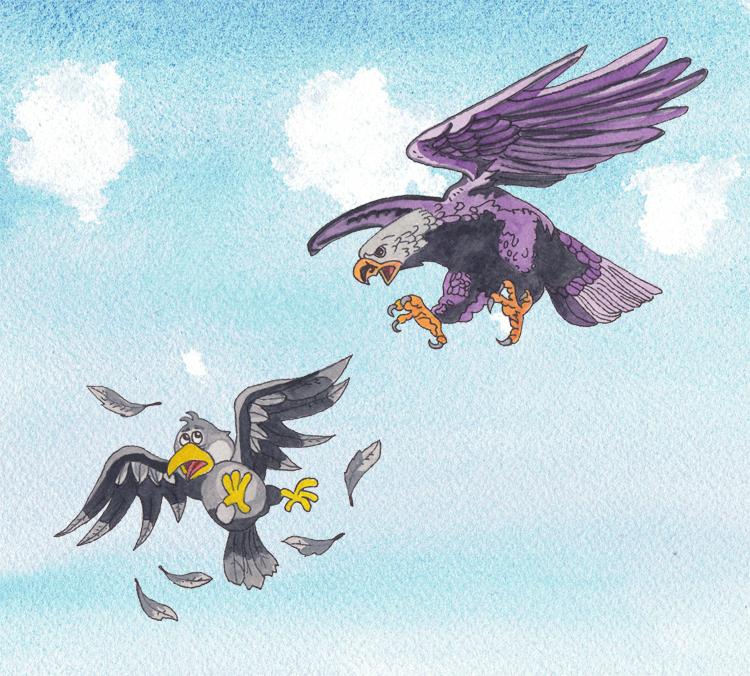
Jataka 384
Dhammaddaja Jātaka
The Story of Dhammaddaja
as told by Eric Van Horn
originally translated by H.T. Francis and R.A. Neil, Cambridge University
originally edited by Professor Edward Byles Cowell, Cambridge University
This is another story about a misbehaving monk. This has been a theme throughout the history of the Saṇgha, even at the time of the Buddha. For lay people, this is a cautionary tale about monastics. True followers of the Buddha must not only give the appearance of being good, they must truly embody the Dharma.
And, to be sure, the fate of the deceitful crow is not very Buddhist, but so be it. After all, the Bodhisatta was just a bird in this lifetime. That is a long way from being a Buddha.
“Practice virtue.” The Master told this story while he was living at Jetavana. It is about a deceitful monk. He said, “Brothers, this is not the first time that this man is deceitful.” And then he told them this story from the past.
Once upon a time when Brahmadatta was the King in Benares, the Bodhisatta was born as a bird. When he grew up, he lived with a retinue of birds on an island in the middle of the sea.
Some merchants from Kāsi (a kingdom in ancient India) got a crow and started on a voyage by sea. In the midst of the sea the ship was wrecked. The crow flew to that island and thought, “Here is a great flock of birds. I will deceit them, and then I will eat their eggs and young.”
So he descended into their midst, and opening his mouth, he stood with one foot on the ground.
“Who are you, master?” they asked.
“I am a holy person.”
“Why do you stand on one foot?”
“If I put down the other one, the earth could not bear my weight.”
“Then why do you stand with your mouth open?”
“I eat no other food. I only drink the wind.” And with that he called out to these birds and said, “I will give you a discourse. You listen.” And he spoke the first stanza by way of a teaching:
Practice virtue, brothers, bless you! Practice virtue, I repeat.
Here and after virtuous people have their happiness complete.
The birds, not knowing that he said this in order to deceive them and to eat their eggs, praised him and spoke the second stanza:
Surely a righteous fowl, a blessed bird,
He preaches on one leg the holy word.
The birds, believing the wicked crow, said, “Sir, since you take no other food but feed on the wind only, please watch our eggs and young.” And they went off to their feeding ground.
When they went away, the evil crow ate his bellyful of their eggs and young. And when they came back, he stood calmly on one foot with his mouth open. Not seeing their children, the birds made a great outcry. “Who can be eating them?” But saying, “This crow is a holy person,” they did not even suspect him.
Then one day the Bodhisatta thought, “There was nothing wrong here before. It only started when this one came. It is good to test him.”
So he pretended that he had gone off to feed with the other birds. But instead he turned back and hid in a secret place. The crow, confident that the birds were gone, rose up and went and ate the eggs and the young. When the other birds came back, he stood on one foot with his mouth open. Then their king assembled them together and said, “I witnessed today the danger to our children. I saw this wicked crow eating them. We will seize him.” The birds gathered together. And surrounding the crow he said, “If he flees, let us seize him.” And he spoke the remaining stanzas:
You know not his ways, when this bird you praise.
You spoke with foolish tongue.
“Virtue,” he’ll say, midst evil ways,
But he eats our eggs and young.
The things he preaches with his voice
His members never do.
His virtue is an empty noise,
His righteousness untrue.
At heart a hypocrite, his language charms,
A black snake slinking to his hole is he.
He cozens by his outward coat of arms
The country-folk in their simplicity.
Strike him down with beak and pinion,
Tear him with your claws.
Death to such a dastard minion,
Traitor to our cause.
With these words the leader of the birds himself sprang up and struck the crow in the head with his beak, and the rest of them struck him with their beaks and feet and wings. And so he died.

Figure: Oh, boy…
His lesson ended, the Master identified the birth: “At that time the crow was the deceitful monk, and I was the king of the birds.”
